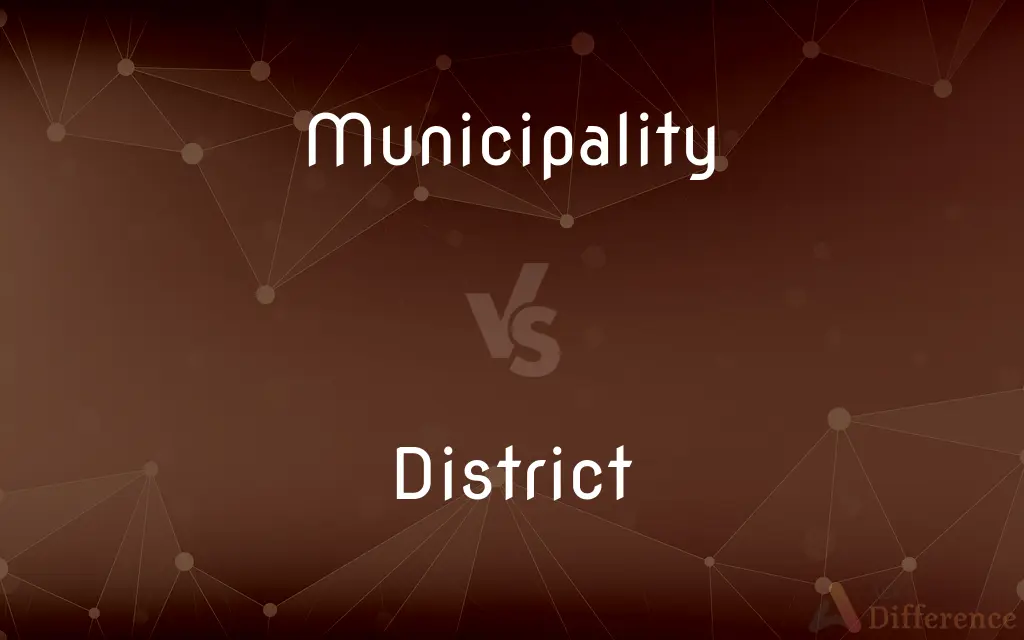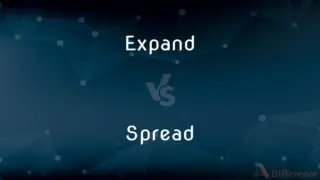Municipality vs. District — What's the Difference?
By Maham Liaqat & Fiza Rafique — Updated on March 18, 2024
Municipalities are administrative regions with local governments, typically cities or towns, whereas districts are larger territories that may contain multiple municipalities.

Difference Between Municipality and District
Table of Contents
ADVERTISEMENT
Key Differences
Municipalities often refer to individual cities or towns that have their own local governments responsible for providing basic services such as water, waste management, and local law enforcement. Districts, on the other hand, are larger administrative units that can encompass several municipalities, cities, or towns.
While municipalities focus on local governance and community services, districts often have a wider scope, dealing with regional planning, development, and sometimes even taxation. The governance structure of districts can vary significantly, depending on the country or region, including how they intersect with or oversee municipalities within their boundaries.
Municipalities provide a more localized and focused form of governance, directly impacting the daily lives of residents through various services and regulations. In contrast, districts might not directly provide services to residents but play a crucial role in organizing and managing resources across a broader area for strategic planning and development purposes.
In terms of administrative hierarchy, municipalities are usually considered the smallest units of local government, directly interacting with the citizens and businesses within their boundaries. Districts, while also important administrative divisions, operate at a level above municipalities, coordinating among multiple local governments, schools, and other entities for regional benefits.
Comparison Chart
Definition
An administrative region with its own local government, typically a city or town.
A larger administrative territory that may contain multiple municipalities.
ADVERTISEMENT
Main Function
Provides basic services like water, waste management, and local law enforcement.
Often oversees broader administrative, educational, or electoral functions.
Governance
Has the authority to enact and enforce local laws.
May not directly govern residents but coordinates resources and planning.
Scope of Service
Focused on local community needs and services.
Deals with regional planning and development.
Level in Hierarchy
Considered the smallest unit of local government.
Operates at a level above municipalities, often encompassing several.
Compare with Definitions
Municipality
A jurisdictional unit for local governance.
Residents voted in the municipality's mayoral election.
District
A region under the jurisdiction of a particular government authority.
The school district is known for its excellent educational standards.
Municipality
An administrative entity governed by a mayor and council.
The municipality passed a new bylaw to regulate parking.
District
A geographical area for administrative, legal, or electoral activities.
The district court has jurisdiction over local legal matters.
Municipality
An urban administrative division with corporate status.
The municipality invested in new public parks.
District
An area defined for administrative, electoral, or other purposes.
The district covers three municipalities and two towns.
Municipality
A city or town with its own local government.
The municipality of Springfield provides weekly trash pickup services.
District
An area distinguished for specific administrative functions.
The historic district attracts tourists from around the world.
Municipality
A region having specific governing and administrative functions.
The municipality launched a campaign to increase recycling.
District
A division of a country or city for administrative or representative purposes.
She represents the 4th congressional district.
Municipality
A municipality is usually a single administrative division having corporate status and powers of self-government or jurisdiction as granted by national and regional laws to which it is subordinate. The term municipality may also mean the governing or ruling body of a given municipality.
District
A district is a type of administrative division that, in some countries, is managed by the local government. Across the world, areas known as "districts" vary greatly in size, spanning regions or counties, several municipalities, subdivisions of municipalities, school district, or political district.
Municipality
A political unit, such as a city, town, or village, incorporated for local self-government.
District
A division of an area, as for administrative purposes.
Municipality
A body of officials appointed to manage the affairs of a local political unit.
District
A region or locality marked by a distinguishing feature
Went to the lake district for their vacation.
Municipality
A district with a government that typically encloses no other governed districts; a borough, city, or incorporated town or village.
District
To mark off or divide into districts.
Municipality
The governing body of such a district.
District
An administrative division of an area.
The Soho district of London
Municipality
(politics) In Mexico and other Spanish- and Portuguese-speaking countries, second-level administrative divisions that may house one or more cities or towns whose head of government may be called mayors or, in Mexico, municipal presidents.
District
An area or region marked by some distinguishing feature.
The Lake District in Cumbria
Municipality
A municipal district; a borough, city, or incorporated town or village.
District
(UK) An administrative division of a county without the status of a borough.
South Oxfordshire District Council
Municipality
An urban district having corporate status and powers of self-government
District
(transitive) To divide into administrative or other districts.
Municipality
People living in a town or city having local self-government
District
(obsolete) rigorous; stringent; harsh
District
Rigorous; stringent; harsh.
Punishing with the rod of district severity.
District
The territory within which the lord has the power of coercing and punishing.
District
A division of territory; a defined portion of a state, town, or city, etc., made for administrative, electoral, or other purposes; as, a congressional district, judicial district, land district, school district, etc.
To exercise exclusive legislation . . . over such district not exceeding ten miles square.
District
Any portion of territory of undefined extent; a region; a country; a tract.
These districts which between the tropics lie.
District
To divide into districts or limited portions of territory; as, legislatures district States for the choice of representatives.
District
A region marked off for administrative or other purposes
District
Regulate housing in; of certain areas of towns
Common Curiosities
Are districts responsible for local governance?
Districts primarily focus on regional planning, development, and sometimes oversight of municipalities rather than direct local governance.
What defines a municipality?
A municipality is defined as an administrative region with its own local government, typically a city or town, that provides basic services to its residents.
How does a district differ from a municipality?
A district is a larger administrative territory that may encompass multiple municipalities, focusing on broader administrative, educational, or electoral functions rather than direct service provision.
Can a district contain multiple municipalities?
Yes, districts often contain multiple municipalities, cities, or towns within their boundaries.
Can a municipality be part of more than one district?
It's possible depending on the country's administrative structure, where a municipality might fall under multiple districts for different functions (e.g., school, judicial).
Can municipalities enact their own laws?
Yes, municipalities have the authority to enact and enforce local laws and regulations within their boundaries.
What services do municipalities typically provide?
Municipalities typically provide services such as water supply, waste management, local law enforcement, and public utilities.
What is the role of districts in education?
Districts often play a significant role in organizing and managing educational institutions and standards within their territory.
Are there different types of municipalities?
Yes, there can be different types, including cities, towns, and villages, depending on their size and governance structure.
How are municipalities governed?
Municipalities are governed by local governments, which can include a mayor and a city or town council.
How do districts influence electoral processes?
Districts can determine electoral boundaries for legislative representations, affecting how elections are organized and votes are counted.
Do districts have their own governments?
The governance structure of districts varies, but they may be overseen by a specific administrative body or authority rather than having their own government.
What is the relationship between municipalities and districts in terms of hierarchy?
Municipalities are considered the smallest unit of local government, while districts operate at a level above, often encompassing several municipalities.
What impact do municipalities have on local communities?
Municipalities directly impact local communities by providing essential services, local governance, and ensuring the well-being of residents through various initiatives.
How do districts affect regional planning?
Districts are crucial for regional planning and development, coordinating among municipalities for infrastructure, economic development, and strategic initiatives.
Share Your Discovery

Previous Comparison
Recognize vs. Acknowledge
Next Comparison
Expand vs. SpreadAuthor Spotlight
Written by
Maham LiaqatCo-written by
Fiza RafiqueFiza Rafique is a skilled content writer at AskDifference.com, where she meticulously refines and enhances written pieces. Drawing from her vast editorial expertise, Fiza ensures clarity, accuracy, and precision in every article. Passionate about language, she continually seeks to elevate the quality of content for readers worldwide.














































